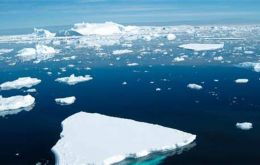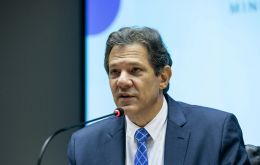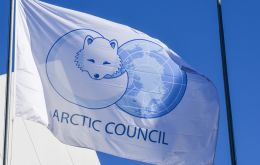MercoPress. South Atlantic News Agency
Tag: Climate change
-
Friday, March 24th 2023 - 02:33 UTC
Crops revolution: England allows gene-edited food to be developed commercially

Gene-edited food can now be developed commercially in England following a change in the law, reports BBC. Supporters of the technology say it will speed up the development of hardier crops that will be needed because of climate change.
-
Wednesday, March 22nd 2023 - 10:11 UTC
Landmark UN Water conference in New York to address climate change and drinking water

Leaders will gather this week in New York City for a landmark United Nations conference, an event expected to focus on the rising toll of the climate crisis and the effort to provide clean drinking water to a global population of over 8 billion.
-
Tuesday, March 21st 2023 - 09:51 UTC
Guterres warns climate bomb ticking

United Nations Secretary-General António Guterres said Monday in a recorded appearance before a UN Intergovernmental Panel on Climate Change (IPCC) that in order to avoid a climate catastrophe, carbon emissions must be halved by 2030 because “the climate bomb is ticking.”
-
Monday, March 20th 2023 - 15:54 UTC
Antarctic sea ice hitting historic lows

A website specialized in weather news published this past weekend a report stating that Antarctic sea ice reached another historic low after a trend of ice loss in recent years seems to have come to stay because while Antarctic sea ice shows an almost flat trend, the minima appear to have gained on that trend.
-
Saturday, March 18th 2023 - 10:01 UTC
Alckmin discusses Brazil's ties with European envoy beyond Mercosur

Brazilian Vice President Geraldo Alckmin met Friday with the European Commission's Executive Vice-President Margrethe Vestager to discuss the South American country's relations beyond the Mercosur deal, Agencia Brasil reported.
-
Tuesday, February 28th 2023 - 08:38 UTC
Antarctic ice reported to be at an all-time low

Antarctic sea ice was reported last Feb. 13 to consist of just 737,000 square miles (1.91 million square kilometers). These figures meant a significant drop from the 741,000 square miles (1.92 million square kilometers) recorded on Feb. 25 last year by the National Snow and Ice Data Center (NSIDC).
-
Monday, February 27th 2023 - 07:57 UTC
US envoy to discuss climate change with Brazilian VP and ministers

United States Presidential Advisor on Climate John Kerry landed in Brasilia Sunday for talks with Vice President Geraldo Alckmin (who is also Minister of Development, Industry, Commerce, and Services), with Environment and Climate Change Minister Marina Silva, and with Deputy Foreign Minister Maria Laura da Rocha,
-
Wednesday, February 22nd 2023 - 08:03 UTC
El Niño to cause irreversible thawing in Antarctica, study finds

According to an investigation by the Australian Government's scientific agency (CSIRO), the “El Niño” phenomenon would cause an increase in underwater temperatures that would cause irreversible melting of the shelves and ice sheets, it was reported on Tuesday.
-
Monday, February 20th 2023 - 10:13 UTC
Brazil's Finance Minister to discuss climate change one-on-one

As he prepares to leave for Bangalore, India, this week to attend a G20 conference of economy ministers ahead of the summit of heads of government and state, Brazil's Fernando Haddad insisted that the largest South American country intends to be active again in the solution of global crises, Agencia Brasil reported. The Finance Minister also said he believed socio-environmental sustainability should be a topic in all his bilateral meetings.
-
Saturday, February 11th 2023 - 15:44 UTC
Launch of 'Looking North: The UK and the Arctic', by Foreign minister Lord Goldsmith

Foreign Office Minister of State responsible for the polar regions, Lord Goldsmith, gave a keynote speech to launch the UK's new Arctic policy framework:
